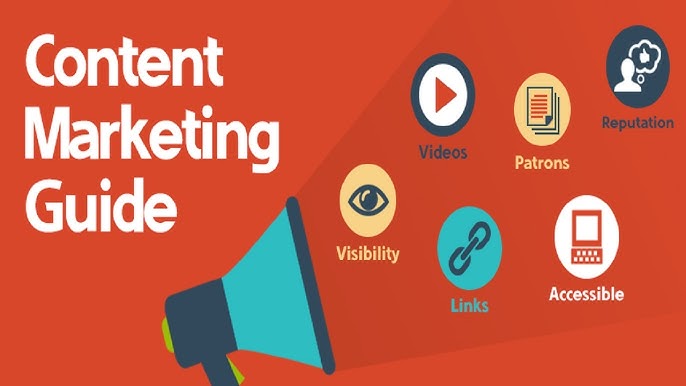The Future of Content Marketing : Creating Engaging Content That Converts
Content marketing has evolved significantly over the years, and with the rapid pace of technological advancements, it continues to change. Businesses and marketers must adapt to new trends, tools, and strategies in order to stay relevant and competitive. This article explores the future of content marketing, with a focus on how to create engaging content that not only attracts audiences but also converts them into loyal customers.
Understanding the Importance of Content Marketing
Content marketing has become a cornerstone of modern business strategy. It is the process of creating and distributing valuable, relevant, and consistent content to attract and retain a clearly defined audience. As the digital landscape evolves, the importance of content marketing grows, particularly because consumers are increasingly seeking information and solutions online.
The goal of content marketing is not just to increase traffic, but to generate leads and drive conversions. In the future, content marketing will continue to play a vital role in how businesses engage with customers, create brand loyalty, and influence purchasing decisions. By providing content that resonates with the target audience, businesses can position themselves as trusted authorities in their industries, fostering long-term relationships with consumers.
The Shift Towards Personalization
One of the biggest trends in the future of content marketing is personalization. Consumers today expect tailored experiences, and content marketing is no different. Brands must move beyond generic content and instead deliver messages that speak directly to the needs, preferences, and behaviors of individual customers. This shift is powered by data and advanced technologies like artificial intelligence (AI), which help marketers understand consumer behavior on a deeper level.
Personalized content can take many forms, including targeted emails, dynamic website content, and social media posts that speak to specific interests. When content is personalized, it feels more relevant, leading to higher engagement rates and stronger connections with the audience. In the future, businesses that fail to personalize their content may struggle to keep pace with competitors who offer more customized experiences.
The Rise of Video Content
Video content has been on the rise for several years, and its popularity is expected to continue growing in the future. Platforms like YouTube, TikTok, and Instagram Reels have shown that consumers crave visual content that is both entertaining and informative. Video allows businesses to showcase their products, tell compelling stories, and engage with their audience in a way that static images or text cannot.
As video becomes even more accessible with faster internet speeds and affordable production tools, businesses will need to integrate it into their content strategies. Whether it’s through tutorials, product demos, or behind-the-scenes footage, video will play a key role in educating and converting potential customers. In fact, studies show that video content is more likely to be shared and remembered, making it a powerful tool for increasing brand awareness and driving sales.
Interactive Content: The Future of Engagement
Interactive content is an emerging trend that allows consumers to actively participate rather than just passively consume content. Quizzes, polls, interactive infographics, and games are examples of content formats that encourage audience participation. This type of content not only captures attention but also boosts engagement by making the experience more enjoyable and memorable.
As technology continues to improve, interactive content will become even more immersive. For example, augmented reality (AR) and virtual reality (VR) are set to revolutionize the way consumers interact with content, providing a more engaging and personalized experience. Businesses that incorporate interactive elements into their content strategies will have a competitive advantage, as they create a more dynamic connection with their audience, ultimately leading to higher conversion rates.
The Role of Artificial Intelligence in Content Creation
Artificial intelligence (AI) is already making waves in content marketing, and its influence is expected to grow even stronger in the future. AI tools can help marketers analyze data, optimize content for SEO, and even generate content automatically. This enables businesses to streamline their content creation process and deliver more targeted messages to their audience.
In the future, AI will play a crucial role in content personalization, helping marketers deliver the right content to the right people at the right time. AI can also assist in analyzing consumer behavior, predicting trends, and improving content performance. While AI may never fully replace human creativity, it will undoubtedly enhance the efficiency and effectiveness of content marketing strategies, making it an essential tool for marketers moving forward.
Voice Search and Its Impact on Content Marketing
As voice-activated devices like Amazon Alexa, Google Assistant, and Apple Siri become more prevalent, voice search is poised to become a dominant force in content marketing. Consumers are increasingly using voice commands to search for information, shop online, and interact with brands. This trend will force marketers to rethink how they create content to ensure it is optimized for voice search.
Voice search queries tend to be more conversational and longer than text-based searches, so businesses will need to adjust their content to match these patterns. Content that is optimized for voice search will be more likely to appear in voice search results, increasing its visibility and driving more traffic. As voice search continues to grow, brands that embrace this technology early will be better positioned to capture the attention of consumers using voice-activated devices.
User-Generated Content as a Trust-Building Tool
User-generated content (UGC) is another trend that will shape the future of content marketing. UGC refers to any content created by consumers or users, such as reviews, testimonials, social media posts, or product photos. This type of content is valuable because it builds trust and credibility with potential customers. Consumers are more likely to trust content created by their peers rather than traditional advertising.
In the future, brands will increasingly rely on UGC to amplify their content marketing efforts. By encouraging customers to share their experiences with products or services, businesses can create authentic, relatable content that resonates with their target audience. UGC also offers social proof, which can help businesses attract new customers and drive conversions. Incorporating UGC into content strategies will become essential for companies looking to build trust and foster long-term relationships with their audience.
Content Distribution: Reaching the Right Audience
Creating high-quality content is only half the battle; distribution is key to ensuring that content reaches the right audience. In the future, content distribution strategies will become more sophisticated, leveraging new technologies and platforms to ensure content is seen by the right people at the right time. Marketers will need to take advantage of tools like social media advertising, email marketing, and content partnerships to amplify their reach.
One of the most effective content distribution strategies will be using data and analytics to identify the most relevant platforms and channels for each piece of content. By understanding where their audience spends their time and what type of content they prefer, businesses can optimize their distribution efforts and maximize engagement. As the digital landscape continues to evolve, mastering content distribution will be crucial for driving traffic, generating leads, and increasing conversions.
The Power of Long-Form Content
While short-form content like blog posts and social media updates are important, long-form content will continue to be a valuable tool in the future of content marketing. Long-form content allows businesses to dive deep into topics, providing more in-depth information and answering customer questions comprehensively. This type of content is also more likely to rank well in search engines, driving organic traffic and boosting SEO.
Long-form content, such as eBooks, white papers, and in-depth guides, can establish businesses as thought leaders in their industry. By providing valuable and well-researched information, businesses can build trust with their audience and position themselves as experts. Additionally, long-form content is more likely to be shared and linked to, further increasing its reach and potential to convert visitors into customers.
The Integration of Social Commerce
Social commerce, or the ability to buy products directly through social media platforms, is expected to grow significantly in the coming years. With platforms like Instagram, Facebook, and TikTok already introducing shopping features, businesses will need to integrate social commerce into their content marketing strategies. This trend allows companies to turn social media engagement into direct sales opportunities, making it easier for consumers to make purchases without leaving the platform.
In the future, social commerce will become more seamless, with brands leveraging social media influencers, live-streamed events, and targeted ads to drive conversions. Content that blends entertainment, education, and shopping will be crucial for brands looking to capitalize on this trend. By creating content that is not only engaging but also directly linked to sales, businesses can improve their ROI and drive more conversions.
The Future of SEO in Content Marketing
Search engine optimization (SEO) will continue to be an essential component of content marketing in the future. However, SEO practices will evolve as search engines become more advanced and AI-driven. Businesses will need to focus on creating high-quality, user-focused content that answers questions and provides value to the audience. Traditional SEO tactics like keyword stuffing will become less effective, and more emphasis will be placed on content relevance and user experience.
The future of SEO will also involve optimizing for new search technologies, such as voice search and visual search. Businesses that stay up to date with SEO best practices and adapt to changing search algorithms will have a competitive edge in driving organic traffic and improving their visibility. SEO will remain an ongoing process that requires constant attention and adaptation, making it crucial for businesses to invest in strong SEO strategies.
Data-Driven Content Strategy
In the future, content marketing will be increasingly data-driven. Marketers will rely on analytics to make informed decisions about what content to create, when to publish it, and which platforms to use for distribution. By analyzing user behavior, engagement rates, and conversion metrics, businesses can fine-tune their content strategies to maximize effectiveness.
Data-driven content strategies allow businesses to create content that is tailored to the needs and interests of their audience. By using data to identify trends and gaps in the market, businesses can produce content that is more likely to resonate with their target demographic. Additionally, data will help marketers measure the success of their content and make adjustments as needed, ensuring that their efforts deliver the best possible results.
Building a Sustainable Content Marketing Strategy
Sustainability will be a key consideration for content marketers in the future. Consumers are becoming more conscious of the environmental and social impact of the brands they support.
As a result, businesses will need to align their content marketing strategies with sustainable practices. This includes focusing on producing high-quality content that provides real value to customers rather than contributing to the growing problem of digital clutter. Sustainable content marketing also involves considering the environmental impact of content creation and distribution. For example, businesses may choose to prioritize digital channels that have a lower carbon footprint or produce content in ways that minimize waste.
Another important aspect of a sustainable content strategy is ensuring the longevity of the content itself. Instead of constantly churning out new content, businesses should focus on creating evergreen content that remains relevant over time. This not only reduces the need for frequent content updates but also ensures that the content continues to engage and convert visitors long after its initial publication. By thinking long-term and incorporating sustainability into their content practices, businesses can build a responsible and enduring brand reputation.
The Role of Content in Building Brand Loyalty
As competition intensifies, businesses will increasingly rely on content to build brand loyalty. Content marketing has the power to connect with consumers on a deeper level by telling stories, addressing pain points, and providing solutions. Brands that create valuable content consistently can build stronger relationships with their audience, fostering a sense of loyalty and trust.
In the future, content marketing will focus more on customer retention rather than just acquisition. While attracting new customers will always be important, maintaining a loyal customer base will become a primary goal. Content can play a key role in this by keeping customers engaged through email newsletters, exclusive content, loyalty programs, and community-building initiatives. By providing ongoing value and creating meaningful experiences, businesses can transform one-time buyers into long-term brand advocates.
Navigating the Future with Ethical Content Practices
As digital marketing grows, businesses will face increasing pressure to prioritize ethical content practices. Consumers are becoming more aware of issues such as data privacy, misinformation, and transparency. Marketers will need to take a responsible approach to content creation by ensuring that their messages are truthful, respectful, and accurate. Ethical content practices also involve respecting consumer privacy and avoiding manipulative tactics, such as clickbait.
The future of content marketing will require businesses to be transparent and honest in their messaging. Brands that embrace ethical content practices will earn the trust and loyalty of their customers, which will ultimately lead to higher conversions. Ethical content will not only help businesses avoid backlash but also set them apart from competitors who rely on unethical marketing practices. In a world where consumers are increasingly making purchasing decisions based on a company’s values, businesses that uphold ethical standards will be better positioned for long-term success.
The Evolution of Content Formats and Delivery Channels
The future of content marketing will bring new formats and delivery channels that businesses will need to embrace. As technology continues to evolve, new ways to deliver content to consumers will emerge, including more immersive experiences like virtual reality (VR) and augmented reality (AR). These technologies will enable businesses to create highly engaging content experiences that captivate their audience in novel ways.
At the same time, traditional formats such as blogs, podcasts, and webinars will continue to be effective for content marketing. Businesses will need to stay agile and experiment with new formats while continuing to optimize their existing content. The key to success will be understanding the preferences of the target audience and choosing the formats and channels that align with their behaviors. In the future, businesses that can adapt to new content delivery methods while keeping content relevant and engaging will be best equipped to thrive in an ever-changing landscape.
Conclusion: Adapting to the Future of Content Marketing
The future of content marketing is exciting, filled with opportunities for businesses to connect with their audience in new and innovative ways. To succeed, companies must embrace personalization, leverage new technologies like AI and video, and create engaging content that adds value to the consumer experience. At the same time, businesses will need to focus on sustainability, ethical practices, and building brand loyalty to ensure long-term success.
Content marketing will continue to evolve, and businesses that stay ahead of trends and adapt their strategies accordingly will be the ones that thrive. By prioritizing quality content, leveraging data-driven insights, and embracing new formats and delivery channels, businesses can create content that not only attracts attention but also converts visitors into loyal customers. The key to success lies in consistently delivering content that resonates with the audience, solves their problems, and provides value at every touchpoint. As the digital world continues to change, the future of content marketing offers endless possibilities for growth and success.






